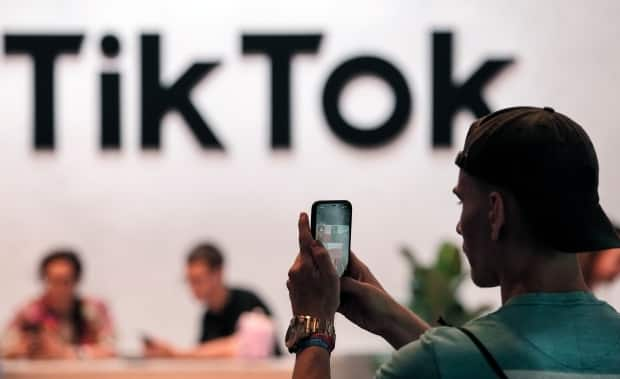Is TikTok bad? Here's why many Western countries are taking a closer look

TikTok finds itself under increased scrutiny on both sides of the Atlantic Ocean, as Western countries cast a critical eye on the reach the Chinese-owned platform holds and the risks that may pose.
Canada's federal privacy regulator and three provincial counterparts this week launched a joint probe into whether the social media platform meets privacy-law expectations and how it collects and makes use of data. Prime Minister Justin Trudeau has separately said the country's electronic spy agency is watching for threats from TikTok.
A pair of key European Union policy-making institutions also banned the video-sharing app from staff phones over cybersecurity concerns this week.
Closer to home, a growing list of U.S. states have reportedly banned the app from government phones. There are also restrictions in place for U.S. federal government employees, with some exceptions.
This intensified focus on everything TikTok comes amid worsening relations between China and the West, a backdrop that experts say should not be ignored.
"There has to be some acknowledgement of the political climate in context that we're debating this [TikTok issue] now," Vass Bednar, executive director of the Master of Public Policy in Digital Society program at Hamilton's McMaster University, told The Canadian Press.
"And I think asking why now is an awkward question because an investigation like this could happen any time and it probably should happen to other companies on social media."
Canadian concerns
The forthcoming Canadian probe involves the federal privacy commissioner and provincial counterparts in British Columbia, Alberta and Quebec — though the issues are of interest nationwide.
"All of Canada's provincial and territorial privacy commissioners have been notified of the joint investigation," Vito Pilieci, a senior communications adviser with the Office of the Privacy Commissioner of Canada, said via email.
WATCH | How worried should you be about TikTok?
Pilieci said the federal watchdog oversees compliance with Canada's federal private-sector privacy law. But the three provinces have their own such laws that may also be applied, which is why their regulators are involved.
After the investigation was announced, a TikTok spokesperson said, "We welcome the opportunity to work with the federal and provincial privacy protection authorities to set the record straight on how we protect the privacy of Canadians."
TikTok has been one of the fastest-growing social media platforms in the country in recent years.
About 26 per cent of adults in Canada are on TikTok, according to a census-balanced online survey taken last spring.That was up from 15 per cent two years earlier.
Seventy-six per cent of Canadian adults aged 18 to 24 had TikTok accounts, according to that same 2022 survey.
The Canadian regulators' probe will partly focus on how the platform's policies affect its youngest users — specifically whether TikTok "obtained valid and meaningful consent from these users for the collection, use and disclosure of their personal information."
Will users care?
McMaster University's Bednar believes the investigation is unlikely to force Canadians to rethink their use of TikTok.

The app is built to draw attention from users and one that TikTok may know people are unlikely to abandon the platform "which perhaps makes the threat [of an investigation] more empty," Bednar said.
However, Sara Grimes, director of the Knowledge Media Design Institute at the University of Toronto, said the discovery of privacy violations or other issues could shift consumer thinking.
"If the investigation does confirm that TikTok is violating our privacy rights, and/or the privacy rights of teens and children, I think it will definitely sway user habits," she told The Canadian Press in an email.
"Contrary to popular belief, young people do care a lot about their privacy and how their data is used. And parents care a lot about their children's data too."
But why TikTok?
Concerns about TikTok aren't new, and the platform is similar to others in many ways. Anatoliy Gruzd, co-director of the Social Media Lab at Toronto Metropolitan University, said the current ones seem somewhat rooted in geopolitical tensions.

"Like other platforms, TikTok collects user data," said Gruzd, noting that bad actors could hack or harass a particular account as they could elsewhere on social media.
But he said the "extra kind of attention" focused on TikTok appears connected to its ownership by ByteDance, a Chinese-owned company and related concerns its data could be made accessible to Beijing.
Lynette Ong, a political science professor at the University of Toronto, is skeptical that the concerns surrounding TikTok-held data are significant when compared to other apps — such as WeChat or Alipay — that may have related financial and personal data more worthy of regulatory attention.
"That is not to say that Chinese firms are not capable of espionage or posing a threat to our national security," she added.
But cybersecurity experts such as Brian Haugli, CEO of the U.S. firm SideChannel, who see danger in the information that TikTok users may be unknowingly sharing, after downloading an app that can "see and store" an individual's location, the networks they access and any incoming messages.
"When you really kind of dig in to all the permissions that are in there, I don't think it's something that most users are either aware of, or willing to really hand over, to a company that's owned and housed inside of China," Haugli told CBC's The National in December.
While such concerns have prompted some TikTok bans on EU and U.S. government devices, it's not immediately clear whether such a step will be taken here.
Asked whether Canada would follow suit, Treasury Board spokesperson Martin Potvin told The Canadian Press by email that Ottawa "is assessing the situation, including the legislative announcement by our U.S. allies, and recently the European Commission, and will determine next steps as necessary."


